UK storms: Extreme weather caused 'years of erosion'
- Published
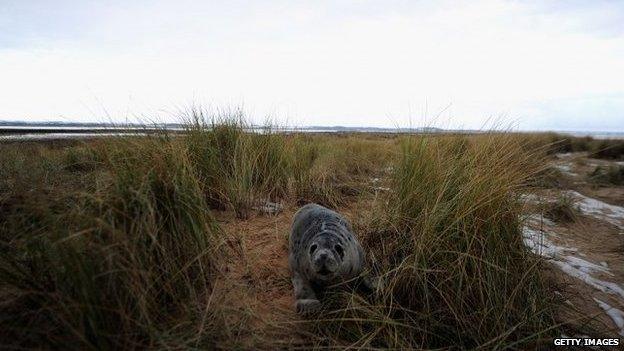
Blakeney in Norfolk is among the natural habitats affected by recent storms and high tides
The speed of coastal erosion caused by recent extreme weather has been "breathtaking", according to the National Trust.
It said that in a matter of weeks some popular areas had suffered levels of erosion which normally take years.
At Birling Gap in East Sussex the trust has had to dismantle some of its buildings after three metres (9ft) of cliff was lost to the sea.
Dorset's Brownsea Island and Mullion Harbour in Cornwall have also suffered.
Jane Cecil, the trust's general manager for the South Downs, said: "We've had about seven years of erosion [at Birling Gap] in just two months.
"As a result of this loss of coastline, we are having to act now and take down the sun lounge and ice cream parlour, safeguarding the integrity of the rest of the building. We have to think long term."
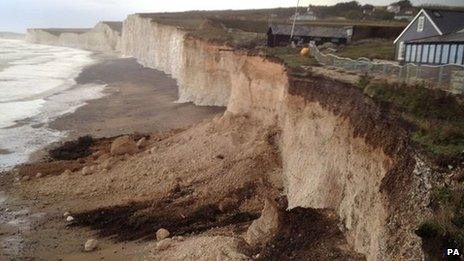
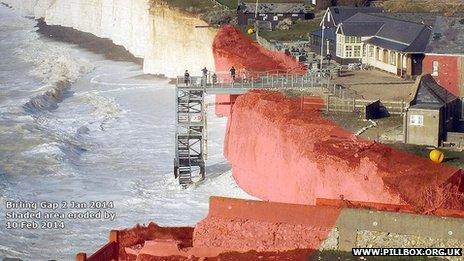
More than 9ft (3m) of the cliff at Birling Gap has been lost to the sea this year
Sand dunes in Formby, on the Sefton coast in Merseyside, have been badly damaged by storms and high tides.
Area ranger Kate Martin said: "In December we had two years of erosion in one afternoon and we're working hard to look at how we manage this intense change at a much-loved stretch of the Sefton coast as dunes are lost and access points become more difficult to manage."
At Rhossili on the Gower Peninsula in South Wales, the main access path to the sandy beach has also been washed away.
Trust countryside manager Alan Kearsley-Evans said: "We'd be planning for this happening but in 10 years' time, not now."
Important wildlife sites at Blakeney in Norfolk, Orford Ness in Suffolk and Murlough national nature reserve in Northern Ireland have also been affected, according to the charity.
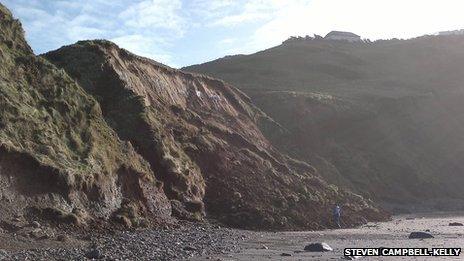
Rhossili succumbed to a landslide in January
The National Trust owns more than 740 miles of coastline around England, Wales and Northern Ireland, around a tenth of the total coastline for the three countries.
Peter Nixon, the trust's director of land, landscape and nature, said: "We're expecting more extremes, less predictability, more stormy events, combined with an underlying issue of rising sea levels."
He warned against the trap of believing "we can engineer our way out of this".
He said: "We all have to be sensitive to those who have become dependent on artificial defences, but if you keep up defending, you build up the risk of a catastrophic event.
"A false sense of security in artificial defences can lead you to a catastrophic collapse, as opposed to a managed impact.
"You can't hold the line everywhere, it's physically impossible and it's not good for society."
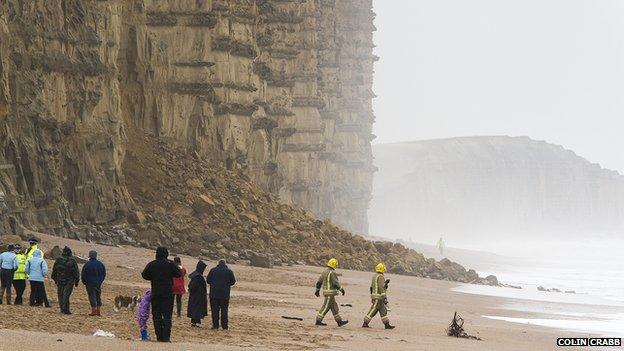
In February a large landslip affected East Beach, West Bay, in Dorset
- Published19 February 2014
- Published13 January 2014
- Published11 January 2014
- Published7 January 2014
- Published11 February 2014